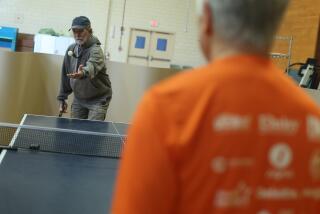Elderly Have Open Minds About Therapy
- Share via
Far from being set in their ways, older people may be more inclined to change their approach to life than younger people, an Oxnard clinical psychologist has concluded after studying the effects of psychotherapy on the elderly at a Ventura County clinic.
In studies conducted over three years, Robert Knight found that elderly patients, a group that had sometimes been considered too confused to respond to psychological treatment, benefited from therapy more than younger patients.
Knight, 38, found that patients older than 60 were more likely than younger patients to show psychological improvement, based on the Global Assessment Scale, a standardized gauge of psychological functioning. He found that equally impressive results could be obtained from patients older than 80 by simply increasing their therapy sessions.
“Older people don’t seem to be resistant to change in the same way as younger people,” said Knight, an associate professor of gerontology and psychology at USC.
Findings Hailed
In 1982, Knight studied 231 clinic patients, with an average age of 72, and found that more than half improved after six months of psychotherapy. Two years later, he compared the results of psychotherapy on a sampling of 125 patients with other researchers’ studies of 1,200 adults under the age of 60, who had been drawn from other Ventura County clinics.
Gerontologists and psychologists who treat the elderly were enthusiastic to learn of Knight’s findings, which will be published as a book entitled “Outreach With the Elderly: Community Education, Assessment and Therapy” this summer by New York University Press.
“We’ve felt that older people were receptive to therapy, but we haven’t had a clear confirmation,” said Robert Kastenbaum, a professor of gerontology at Arizona State University. “If he’s documented this, then it would be a valuable thing.”
Those sentiments were echoed by Barbara Roth, director of Ventura County’s Senior Outreach Program, the publicly funded mental health clinic where the studies were conducted from 1981 to 1984.
More Programs for Elderly
“People have a tendency to give up on older adults,” said Roth, whose clinic last year treated 2,000 older people in their homes or at its Main Street office in Ventura. “They conclude that they’re older and set in their ways. It’s like, ‘Why bother?’
“In fact, they’re really rewarding,” she said. “I’ve seen some incredibly ill people who would have been put in nursing homes or killed themselves if they hadn’t gotten treatment.”
Knight, who served as the program’s director until taking the USC post last fall, hopes that his book will encourage providers of mental health to tailor more programs for the elderly.
While the elderly made up 11% of the population nationwide, they accounted for only 6% of the people who sought psychological counseling, according to a 1983 study cited in “Outreach.”
The need for such programs is expected to escalate with the graying of America, Knight said. In the 10 years since the founding of Senior Outreach Program, which was one of the first state-funded mental health clinics for the elderly, the county’s senior population has doubled, he said.
Knight said the elderly may respond better to therapy because of their “wealth of information about the self and other people.” He added that they are not distracted to the same extent as younger people by work and family pressures. The realization that time is running out may give the elderly a stronger incentive to adjust or adapt, he said.
“If life has been painful,” he said, “you’d like to have some good years.”
Prejudice Cited
Mental health professionals may have overlooked the elderly because of prejudice, he said.
“Many feel that the desire of a 70-year-old to commit suicide is reasonable, whereas the same desire at 32 is senseless and tragic,” he said.
A tendency by elderly people to describe emotional ills in physical terms hasn’t helped matters, Knight said. Physicians who find no physiological basis for the complaints often incorrectly conclude that the patient is well, he said.
A 1982 study found that 60% of older people with physical complaints were found to have a mental disorder. Knight, who no longer sees patients, said he saw numerous examples in his practice.
One older woman, who was upset about her marriage of 45 years, complained to Knight of pains in her chest, arms and legs. A man in his mid-80s refused to walk long after his physician believed that he had recovered from a mild fall. In therapy, he revealed that he was severely depressed about the death of his wife of 60 years.
“A lot of older people are just sad, depressed, not going out much,” Knight said. “They wonder if it’s worth it.”
Others suffer from the stress of caring for aging spouses and parents, or have long-term emotional illnesses that have grown worse through lack of treatment.
“The current generation of older people were well into middle age by the time psychiatry and counseling were widely available,” Knight said. “Most of them think of mental health in terms of the state hospital system.”
The elderly have more trouble getting to and paying their therapists. “Many are either poor or feel that they should save their funds for future health crises,” Knight wrote in his book.
In “Outreach With the Elderly,” Knight recommends that mental health clinics follow the model set by the Senior Outreach Program, which sends therapists to half of its patients’ homes and helps the elderly apply for public assistance to pay for treatment.
More to Read
Sign up for Essential California
The most important California stories and recommendations in your inbox every morning.
You may occasionally receive promotional content from the Los Angeles Times.










